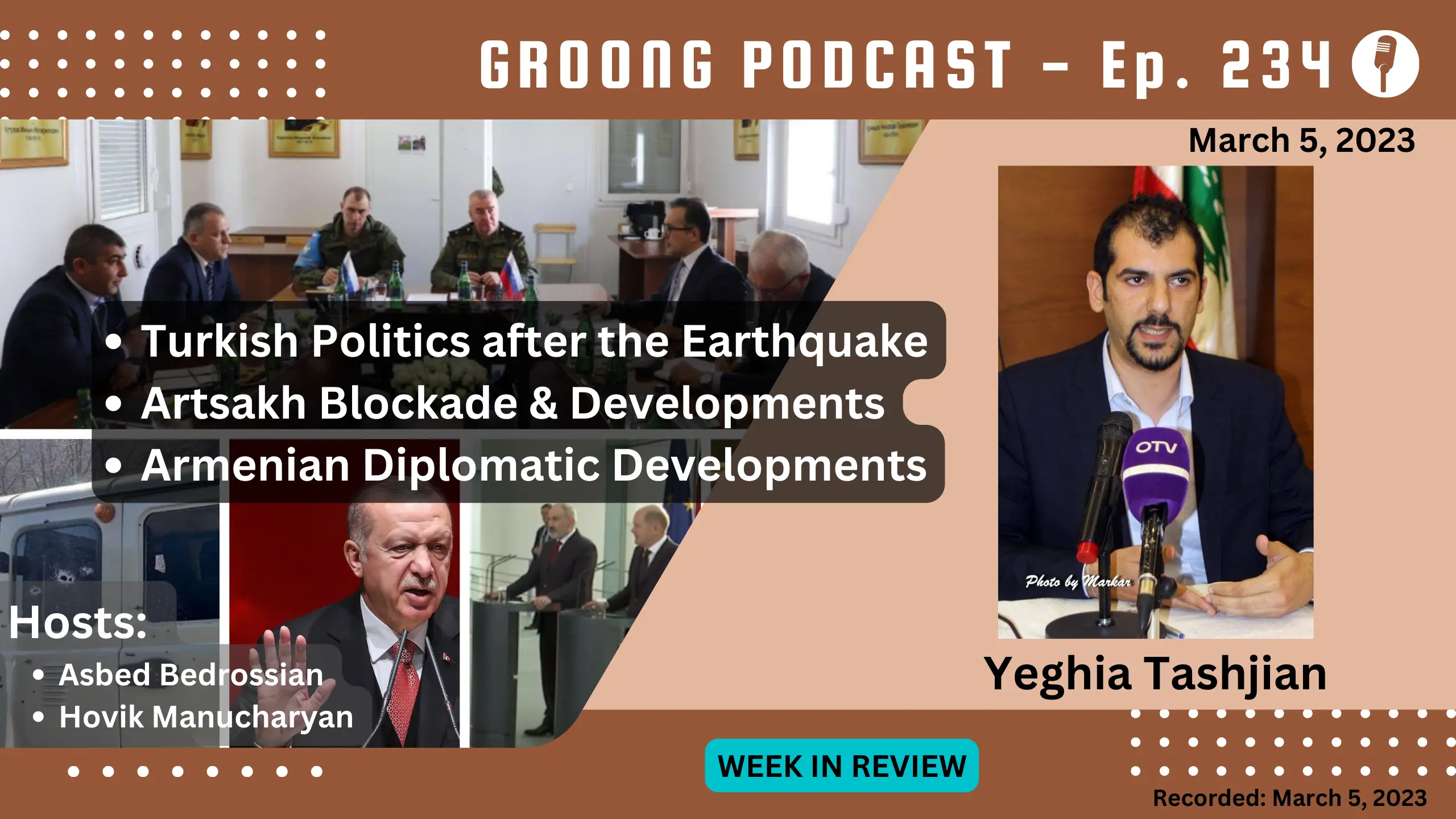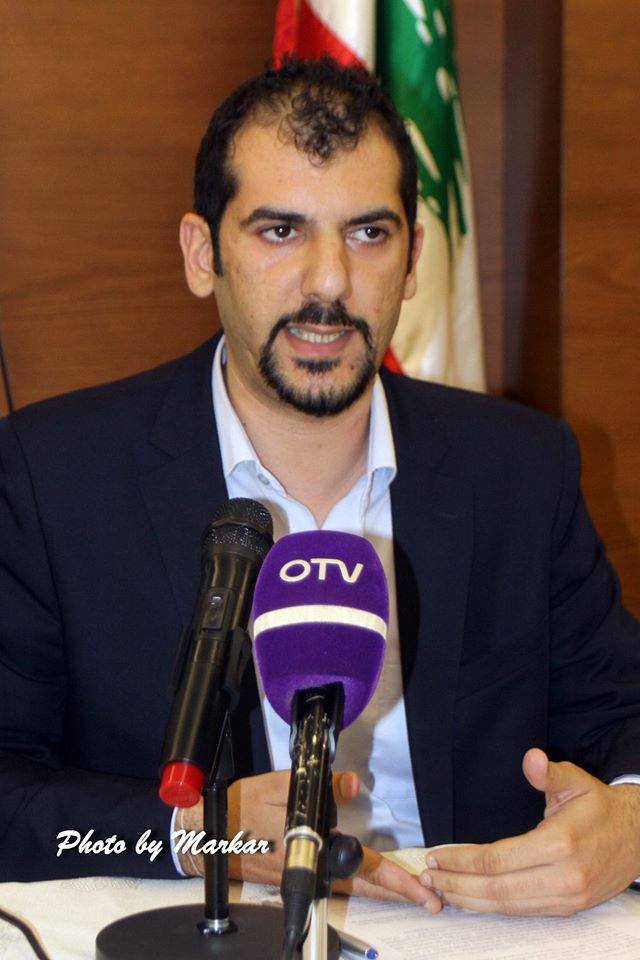
Guest:
Topics:
- Turkish Politics after the Earthquake
- Artsakh Blockade and Developments
- Armenian Diplomatic Developments
- Egyptian President’s Visit to Armenia
Episode 234 | Recorded: March 5, 2023
Show Notes
Turkish Politics after the Earthquake
We’ve talked a lot about the earthquake in Turkey and Syria that happened a month ago. Over 50,000 people were killed in those two countries, among them Armenians.
This coming May, Turkish presidential elections are due to be held, and president Erdogan is of course up for reelection. We want to explore how the earthquake has shifted the political maneuvering in Turkey.
For a while after the earthquake it wasn’t clear if the presidential elections were going to be held as planned on May 14. While the announced reasons were logistical, about martial law, etc., the real reasons concerned Erdogan’s political considerations for a successful re-election. As of now, the elections are back on.
The anti-Erdogan opposition “Table of Six” has bifurcated. Out of the six opposition parties, five have agreed to nominate the more secular Kemal Kiliçdaroglu, while the nationalist IYI party has pulled out of the alliance; they want to nominate either the mayor of Istanbul, Ekrem Imamoglu, or Ankara mayor Mansur Yavas. Imamoglu has been pushed out of politics by Erdogan who has filed criminal charges against him.
Questions:
- What does the Turkish election calculus look like right now?
- The IYI is a party that came together from a split of prominent people from the Nationalist Movement Party (MHP), being joined by splitters from the Republican Party (CHP) and they’re led by Meral Akşener. Why do they reject Kiliçdaroglu? How important are they, and could they significantly alter the trajectory and agenda of the anti-Erdogan camp?
- Is Turkey’s policy towards Armenia likely to be subject to any change, regardless of who gets elected? Can you recall any specific statements or policy positions from the Turkish opposition regarding Armenia?
As we’ve noted before, Armenia also dispatched rescuers to both Syria and Turkey, and the border with Turkey was opened twice to let through convoys of trucks carrying Armenian aid to the distressed areas. That was a first, since Armenia gained independence after the fall of the Soviet Union.
Questions:
- Does Armenia’s aid effort and Turkey’s so-called “earthquake diplomacy” make any difference in their foreign affairs agenda? Does this earthquake shift Turkey’s attention from regional, Pan-Turkic, expansive policies for a time being?
- Will the economics of the earthquake cause Turkey to take pause from encouraging Azerbaijan from maximalist positions, for example in pushing for a so-called “Zangezur corridor”, or assimilating Artsakh?
Artsakh Blockade and Developments
Armenian Azerbaijani Reps Meet
Since Ruben Vardanyan’s dismissal, both the Artsakh and Azerbaijani sides have appointed representatives and have held two discussions, in the presence of the Russian peacekeepers. While Azerbaijan has tried to paint these discussions as being about “reintegrating Karabakh back into Azerbaijan”, the Artsakh government has rejected this and gave a detailed report of the meeting. They’ve also said that these talks are not a substitute for peace negotiations, which must take place in an internationally visible process.
Question:
- Given that there’s a disconnect on the Azeri side of why and what they’re discussing with Artsakh, can we expect much from these discussions, or are they happening to placate the international community, which has been calling for an end to the blockade?
Since that meeting earlier in the week, there have been daily reports (6 days in a row) about Azeri violations of ceasefire, with both civilian and military being targeted. Today, a subversion group from Azerbaijan infiltrated Armenian-held territories, in contravention of the cease-fire, and attacked an Artsakh police car, killing three and injuring one police officer.
Questions:
- Does this mean Azerbaijan doesn’t like how the negotiations are going?
- Are they threatening that if Artsakh does not negotiate the issues that they’re asking for, then Azerbaijan will begin even larger hostilities?
Armenian Diplomatic Developments
Pashinyan in Berlin, Scholz Retraction
This past week Pashinyan visited Germany and met with members of the Bundestag and chancellor Olaf Scholz. In the ensuing press conference Scholtz indicated that Germany backs Artsakh’s right to self-determination, which he said was an international principle equal to that of territorial integrity.
That, together with the ICJ partially ruling in favor of Armenia on its request to take all measures in its disposal to unblock the Lachin/Berdzor corridor, and UN Secretary Antonio General Guterrez and the EU both calling the ICJ ruling “binding”, we thought maybe there’s an interesting story developing.
But Azerbaijan has yet to lift the blockade, and worse yet, the day after the press conference, Scholz’s mention of self-determination was silently edited out of the official text of the speech on the German government’s website, while leaving in “territorial integrity”.
Questions:
- What would make chancellor Scholz defend Artsakh’s right to self-determination, or was it a mistake on his part?
- How important are these developments? Are these in preparation for status, or peace negotiations between Artsakh and Azerbaijan?
- What levers does the EU have to enforce ICJ rulings?
Pashinyan’s Stony Silence
While Olaf Scholz was talking “self-determination”, Pashinyan next to him was completely silent. Specifically, Scholz said that the conflict in Artsakh should be resolved based on the territorial integrity of Armenia and Azerbaijan, as well as self-determination of people in Artsakh. Pashinyan was stone silent.
Later on, in a community meeting Pashinyan was asked about self-determination again, and he completely avoided using that term.
Questions:
- Is Pashinyan under orders not to talk about self-determination? Even his party’s 2021 program talks about it, so it’s not like we’re bringing up ancient history.
- What does the removal of the “self-determination” text mean?
- Scholz also mentioned concerns about Armenia helping Russia evade EU sanctions? How serious are these concerns and what are the risks for Armenia?
Visit of Egyptian President to Armenia
At the end of January Egyptian president Abdel Fattah El-Sisi was in Armenia. El-Sisi offered readiness to mediate between Armenia and Azerbaijan, if the two countries were interested in that. He also talked about a mutual trust between Egypt and Armenia, and of course we know that there’s a solid Armenian community there.
This relationship, with Egypt, but also with a lot of the Arab world, is a deeply underutilized, or under-managed vector in Armenian diplomacy.
Questions:
- Why was such a high level visit to Armenia made, and why now?
- Do you expect this relationship to grow?
- What are the potential bases for such a relationship?
- Are there any obstacles to Armenian-Egyptian relations?
Topics from the Panelists
- Hovik - Today is Vazgen Sargsyan’s birthday
- Yeghia - Keeping hope alive in Lebanon.
Wrap-up
We hope you found our Week in Review helpful. We invite your feedback and your suggestions, you can find us on most social media and podcast platforms. Thanks to Laura Osborn for the music on our podcasts.
Guests

Yeghia Tashjian
Yeghia Tashjian is an regional analyst and researcher based in Beirut, with expertise in China’s geopolitical and energy security interests in Iran and the Persian Gulf. Currently he is an instructor in International Affairs at the American University of Science and Technology and International and Regional Affairs Cluster Coordinator at the Issam Fares Institute for Public Policy and International Affairs at the American University of Beirut.
Hosts

Hovik Manucharyan
Hovik Manucharyan is an information security engineer who moved from Seattle to Armenia in 2022. He co-founded the ANN/Groong podcast in 2020 and has been a contributor to Groong News since the late 1990s.
Disclaimer: The views expressed by Hovik Manucharyan on the ANN/Groong podcast are his own and do not necessarily reflect the opinions of his employer or any other organization.

Asbed Bedrossian
Asbed Bedrossian is an IT professional, and for years oversaw the central IT enterprise infrastructure and services at USC. His decades of experience spanned across IT strategy, enterprise architecture, infrastructure, cybersecurity, enterprise applications, data center operations, high performance computing, ITSM, ITPM, and more.
Asbed founded the Armenian News Network Groong circa 1989/1990, and co-founded the ANN/Groong podcast in 2020.